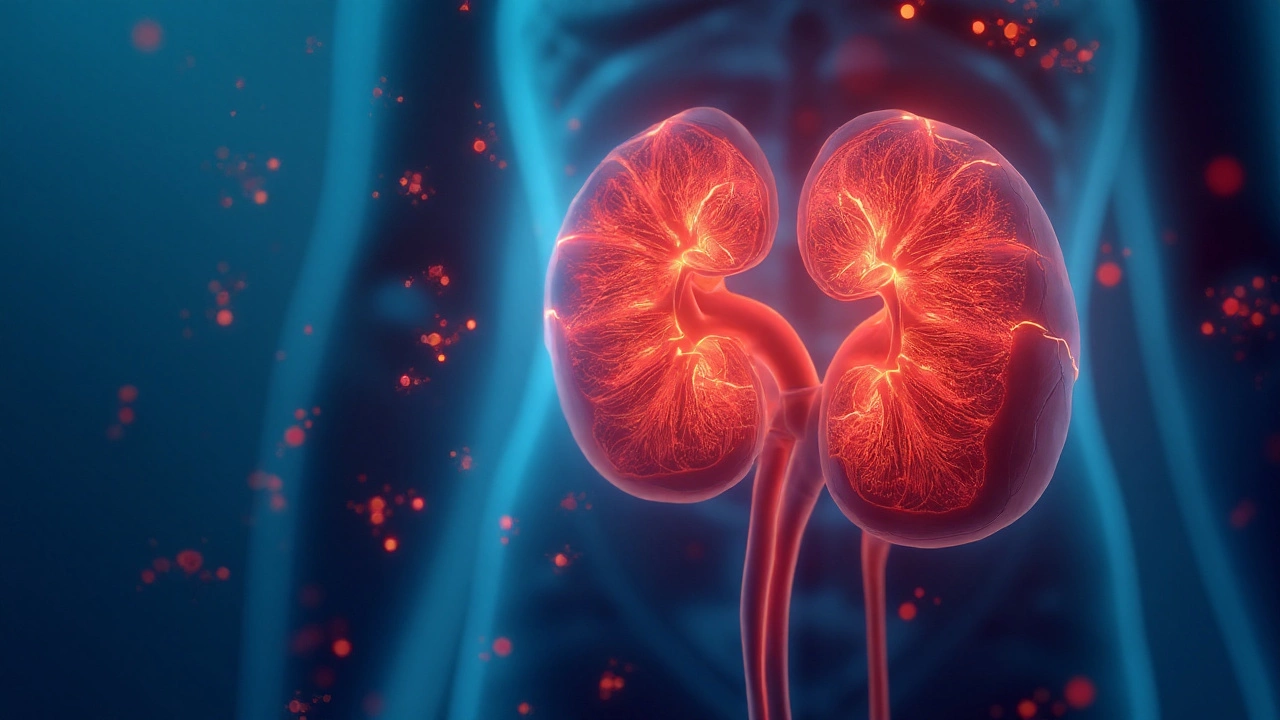- Home
- ::
- Does Too Much Vitamin B12 Harm Kidneys? Expert Insights & Science Explained

Does Too Much Vitamin B12 Harm Kidneys? Expert Insights & Science Explained
Someone downed three energy shots and wondered, “Hey, can I overdo this B12 thing?” Believe it or not, this question pops up a lot—especially with shelves full of B12 boosters, energy bars, and one-a-day multivitamins calling your name. Tons of folks figure vitamins can’t hurt, but the story with B12 and your kidneys is actually a lot juicier than you think. It’s not just about the old myth, “If you take too many vitamins, you’ll just pee out the excess.” Is that really the case, or can your kidneys pay the price for all those mega doses?
How Vitamin B12 Works in Your Body (& Why Kidney Health Matters)
The basics first. Vitamin B12, also called cobalamin, keeps your body humming—helping your nerves, blood cells, and DNA. Your body can’t make B12, so you need it from food. Natural sources? Think red meat, fish, dairy, and eggs. A decent breakfast of eggs and a glass of milk gets you most of what you need. But if your diet skips animal products or you have digestion issues, you might turn to supplements.
B12 is water-soluble. That means your body doesn’t store giant piles of it, like it does with vitamin A or D. Any extra B12 usually travels out in pee, so the norm is that it doesn’t build up to dangerous levels. The kidneys, those neat little filters behind your tummy, take care of moving excess B12 into your urine.
But here’s a catch—we’re talking about ‘usually.’ Your kidneys need to work smoothly to clear all that B12. If they’re not, things can get weird. Early research found that people with kidney troubles had unusually high levels of B12 floating around. Why? Kidneys that don’t filter well can’t get rid of stuff efficiently, so B12 tends to hang around longer than intended. In these cases, you might see B12 numbers shooting up, even if you’re not taking mega-supplements.
The recommended daily allowance (RDA) of B12 for healthy adults? Just 2.4 micrograms per day. Most energy drinks or supplements pack in hundreds, sometimes even thousands of micrograms per serving. That’s like using a fire hose instead of a garden sprayer for your thirsty plants—way more than needed. So, are these huge doses dangerous, or is your body fine just flushing the excess out?
Let’s check real data before blaming B12 for kidney woes. Large surveys like NHANES (National Health and Nutrition Examination Survey—yes, that long name) looked at B12 usage and kidney markers in different age groups. For most folks with healthy kidneys, taking extra B12 hasn’t shown increased risk of kidney damage. But for people with chronic kidney disease, studies from Harvard (2021) and Beijing showed that high B12 doses from supplements could actually backfire. Instead of helping, it might stress inefficient kidneys and build up to toxic levels, especially if taken with folic acid.
The short story: with functioning kidneys, your body usually handles even large B12 supplements like a champ. But if your kidneys are already struggling, too much B12 can pile up, and that’s when trouble can start brewing.
If you’re into numbers, here’s what typical B12 levels look like:
| B12 Status | Blood Serum Level (pg/mL) | Implication |
|---|---|---|
| Normal | 200–900 | Healthy range |
| Deficiency | <200 | Risk of anemia, nerve issues |
| Very High | >900 | Possible kidney problems or too much supplementation |
So, unless your bloodwork says otherwise—or your doctor tells you differently—huge doses aren’t a must, and might not even get you extra superpowers!

Too Much B12: What Science Really Shows About Risks and Myths
It’s easy to find horror stories online about B12 causing all sorts of issues. But what does real science actually say? Well, it turns out that confirmed toxicity from B12 (like, actual, organ-damaging poisoning) is super rare. Unlike fat-soluble vitamins, water-soluble B12 isn’t usually hoarded in your system. But there are a few curveballs even the experts didn’t expect.
First, let’s talk numbers. A 2024 clinical review published in ‘The Lancet’ tossed a spotlight on more than 2,900 patients using B12 long-term. Only a handful had any notable side effects, and most of those were people with severe kidney disease or rare genetic quirks. Usually, it’s impossible to “overdose” in any scary way just through food. But people taking daily B12 injections or high-dose supplements (think: >1,000 mcg/day) for months—especially if they already have sluggish kidneys—sometimes ran into trouble with blood cell counts, skin rashes, or other oddities.
There’s one eyebrow-raising case in 2019, where an older woman with chronic kidney failure kept taking huge B12 injections even after her doctor said to cut back. Result? She started showing weirdly high blood counts. Nothing life-threatening, but her doctors had to step in and taper her supplements.
Now, why does B12 seem to hang around in kidney patients? When kidneys filter less efficiently, not just B12 but other waste products can get stuck in the system—including things like urea and creatinine. This can make B12 levels in blood tests look elevated, even if you’re not swallowing massive amounts. It’s a weird feedback loop and sometimes makes the patient look like they’re getting “toxic” off normal doses, when it’s just lousy filtration.
But don’t take this and throw out those vitamins yet. For most healthy folks, even big B12 doses pass through the urine with barely a hiccup. It’s when you have undiagnosed kidney troubles that B12 supplements could sneakily amp up your blood levels. And it’s not just the amounts— B12 shots and boost drinks can have additives that sometimes mess with your system, too. Do those little “shots” really boost energy or just burn a hole in your wallet? Some placebo-controlled research says they barely move the needle if you already have normal B12 levels.
Can B12 actually hurt your kidneys directly? There’s very little evidence pointing that way. Most warning comes from unusual cases, usually in people with significant kidney impairment, or, once in a while, those taking oddly massive B12 doses (we’re talking tens of thousands of micrograms). Any direct damage is more about your system’s inability to get rid of the extra B12, not the vitamin doing the damage itself.
So how do you spot a problem? Weakness, headache, weird tingling in your hands or feet? Yeah, these can be signs of both B12 deficiency and overload, but they’re not common unless something bigger (like malfunctioning kidneys) is going on. Advanced kidney patients already have other symptoms ongoing, so if you’re perfectly healthy, there’s not much to worry about. But popping handfuls of “just-in-case” supplements? Not really a winning plan unless your doc orders it.
Still want a daily dose? Grab a multivitamin that sticks to the RDA or close to it and ask your doctor before stacking extra supplements. This is especially key if you have diabetes, high blood pressure, or other risks for kidney issues. There are some genetic factors too—if you have a disorder that affects B12 metabolism (like certain rare enzyme deficiencies), your risk is higher too. Not sure? There are now at-home test kits for B12 and kidney function, or you can ask for a basic bloodwork panel once a year.

Smart Ways to Balance B12 (Without Stressing Your Kidneys)
If you made it this far, you’re already ahead of the game—most people never bother checking their vitamins against their kidney health. Want practical steps for playing it safe with B12? Here’s a plan that’s easier than meal prep on a Sunday afternoon.
- Eat B12-rich foods a few times a week if you’re an omnivore. Fish, eggs, and cheese all pack plenty of B12.
- If you’re vegan or vegetarian, look for fortified cereals, plant milks, and nutritional yeast with added B12.
- Before supplementing, get your levels tested—especially if you have kidney conditions, digestive issues, or take meds like metformin or antacids (these can affect B12 absorption).
- If your bloodwork shows deficiency, follow your healthcare provider’s advice on dosing. Usually, low-dose pills are enough, and rarely are daily high-dose shots needed long-term.
- If you have diagnosed kidney problems, avoid over-the-counter high-dose B12 until you clear it with a nephrologist.
- Be skeptical of wild health claims—supplements may help if you’re low, but don’t expect them to boost memory, energy, or weight loss if you’re already in the normal range.
- Watch for misleading marketing. Many “energy” supplements pump up the B12 as a gimmick. Check the label—1000 mcg isn’t better than 2.4 mcg if you’re already topped up.
- Stay hydrated. Water helps your kidneys flush out excess water-soluble vitamins, including B12.
- If you notice symptoms after ramping up your supplements—rash, swelling, confusion—call your doctor and ask about both your B12 and kidney function.
- Share your supplement list when you see your doctor, especially if you get blood checks for anything else. Lots of things can mess with test results, B12 included.
Not convinced you need to stress about B12? The vitamin B12 story is mostly about balance. Eat varied foods, get checked if you’re in a high-risk group, and don’t go nuts with high doses unless there’s a medical need. If you have kidney disease, stay sharp and coordinate with your health team. If your kidneys work like clockwork, odds are, that extra B12 isn’t hurting a thing—but it might be money down the drain, literally.

 Health and Wellness
Health and Wellness





Write a comment